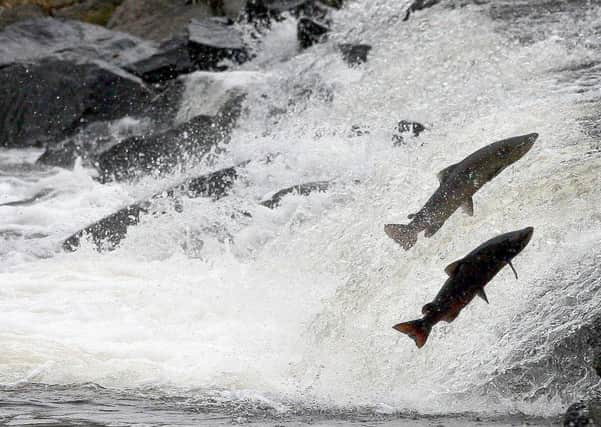Leaders call for moratorium on killing salmon


The new salmon fishing season will open on Scotland’s main salmon rivers over the next few weeks, amidst rising fears of a dramatic decline in stocks.
And the Association of Salmon Fishery Boards (ASFB) today unveiled proposals for no salmon to be killed in Scotland – either by nets or rods – before 15 May .
Advertisement
Hide AdAdvertisement
Hide AdAnglers throughout Scotland already operate a catch and release policy. But the ASFB, the representative body for Scotland’s 41 District Salmon Fishery Boards, claims that additional protection safeguards are now urgently needed.
Alasdair Laing, chairman of the ASFB, said: “Numbers of returning adults are so low that some stocks of Spring salmon are close to, or below, being self-sustaining. The earliest running fish are the most vulnerable. It is a well-established management principle that breeding fish should not be killed where a stock is threatened or vulnerable.
“On that basis it is the ASFB recommendation that no fish should be killed before 15 May. Where local evidence demonstrates that additional protection is required, District Salmon Fishery Boards may wish to maintain a zero exploitation policy for a longer period.”
He continued: “Over recent years very high levels of catch and release have been achieved during the Spring, largely through voluntary policies and we are encouraging all DSFBs to ensure that their conservation policies reflect this position.”
The association claim that it is internationally recognised that mixed stock fisheries present particular difficulties for management and species conservation. And Dr Alan Wells, Policy and Planning Director for ASFB, explained: “DSFBs are duty bound to implement conservation action during any period that stock analysis indicates that management intervention to protect stocks from inappropriate levels of
exploitation is necessary. In this context we would also urge all netting interests to engage with their local DSFB to develop and implement local agreements continuing the significant support that has been shown by both netsmen and anglers to protect vulnerable early running salmon.”
Fisheries review
The Scottish Government has already announced a major review of fisheries management in Scotland. And the management of coastal netting will be considered as part of the review.
Dr Wells said: “DSFBs are duty bound to implement conservation action during any period that stock analysis indicates that management intervention to protect stocks from inappropriate levels of exploitation is necessary. In this context we would also urge all netting interests to engage with their local DSFB to develop and implement local agreements continuing the significant support that has been shown by both netsmen and anglers to protect vulnerable early running salmon.”
Advertisement
Hide AdAdvertisement
Hide AdNick Yonge, a spokesman for the River Tweed Commission, said: “The Tweed has very small stocks of Spring salmon. These are distinct breeding populations of fish and we know that there are only just enough of them to sustain the populations. Without our Spring Conservation Scheme, which prohibits killing rod caught Spring fish, in some years there would be insufficient breeders to keep these stocks sustainable”.
Andrew Wallace, chairman of the Rivers and Fisheries Trusts of Scotland, backed the moratorium call. He said: “This is an excellent, proactive move by the ASFB aimed at conserving what is universally acknowledged to be a stock of fish under considerable pressure at present. By reducing all lethal exploitation on spring stocks before 15 May Scotland can claim to be taking its salmon conservation obligations seriously both in domestic and international fora.”
Earlier this week it was revealed that salmon catches on the Spey - the seventh largest river in Britain - were only 5,780 last year, compared to a ten -year average of 9,000 fish. In 2006 and 2008 about 11,500 salmon were caught on the Spey.
The board’s director Roger Knight said “That situation was not peculiar to just the River Spey. It was a pattern that was reflected across many rivers across Scotland throughout last year.”
‘Wholesale killing’
Last November Scotland’s salmon netsmen were accused by the Salmon and Trout Association in Scotland of paving the way for the “wholesale killing” of the vital Spring run after tearing up a longstanding voluntary agreement to delay the start of the salmon-catching season.
Netsmen are legally entitled to start netting in mid February but the delay has meant that, since 1999, no Spring salmon has been caught until April at the earliest.But the netsmen have voted to scrap the voluntary six week delay.
Keith Allan, the secretary of the netsmen’s association, accused anglers of doing nothing for salmon conservation for 14 years while netsmen had suffered financially as a result of their voluntary postponement.